|
|
|
Sort Order |
|
|
|
Items / Page
|
|
|
|
|
|
|
| Srl | Item |
| 1 |
ID:
141142


|
|
|
|
|
| Summary/Abstract |
The emergence of China as a development actor across the global South has raised significant questions regarding the extent to which the country presents new development opportunities to its compatriots in the South. My aim is to reflect on and parse out the experiences and policies that have shaped China’s development to assess how it can inform the field of development studies. I argue that we need to critically engage in China’s development process, as China’s own development has led to the emergence of many more problems than solutions, ranging from increasing inequality to exclusionary development practices pertaining to ethnic minorities.
|
|
|
|
|
|
|
|
|
|
|
|
|
|
|
|
| 2 |
ID:
141137
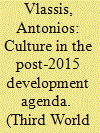

|
|
|
|
|
| Summary/Abstract |
Throughout 2012–15 several actors were advocating that culture be explicitly integrated within the post-2015 UN development agenda. My article offers an anatomy of the recent international mobilisation in order to understand the cleavages and the contrasting visions. In doing so, it seeks to analyse the policy process through which the agenda is made, why and how a critical mass of actors is attempting to embrace the inclusion of culture in the post-2015 agenda and the political reactions vis-à-vis this mobilisation. The article argues, on the one hand, that the promotion of culture in the post-2015 agenda is largely based on UNESCO’s will to advance its policy agenda and enhance its position within the UN system and, on the other hand, that this mobilisation lacks political support from the most influential governments; therefore its chances of success are more than contingent.
|
|
|
|
|
|
|
|
|
|
|
|
|
|
|
|
| 3 |
ID:
141136
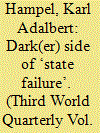

|
|
|
|
|
| Summary/Abstract |
Scholars concerned with the formation of states, specifically the relationship between state formation and war, hold one of two positions. Some agree with Charles Tilly’s historiological conclusion that war is decisive for the establishment of stateness and specify key concepts, in order to explain presumed discrepancies between past and present. Others point towards the international sphere in its current form and advocate a ‘war breaks states’ perspective. This paper argues that both standpoints neglect the ‘sub-national’ level. While proponents of the ‘war breaks states’ thesis are missing para-sovereign zones of rule, supporters of the ‘war makes states’ approach take a juridical view of statehood and focus on ‘state strength’. The failed states paradigm guiding contemporary security and development policy hinders an adequate analysis of the actual situation on the ground. Discussing the shortcomings of failed states approaches and state formation theorising, the paper proposes a conceptualisation in terms of socio-political variation instead of a mere dichotomisation of order. Some conclusive questions are raised, indicating future research directions linked to the historical sociology of state formation.
|
|
|
|
|
|
|
|
|
|
|
|
|
|
|
|
| 4 |
ID:
141139
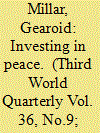

|
|
|
|
|
| Summary/Abstract |
In peace-building and transitional justice literature economic restoration is considered central to sustainable peace in post-conflict societies. However, it is also widely recognised that many post-conflict states cannot afford mechanisms to provide restoration. Not only are many such states poor to begin with, but violent conflict further degrades their economic capacity. As a result, in their need to provide jobs, generate tax revenues, spur development and promote sustainable peace, many post-conflict states turn to alternative processes of economic restoration. This paper examines the potential for foreign direct investment (FDI) to serve as one alternative means by which to provide economic restoration in post-conflict states. Presenting findings from six months of fieldwork evaluating one such project in rural Sierra Leone, the paper describes how local people experience such projects and explores whether employment and land-lease payments can provide experiences of economic restoration so far unforthcoming from the state.
|
|
|
|
|
|
|
|
|
|
|
|
|
|
|
|
| 5 |
ID:
141138
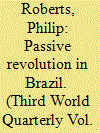

|
|
|
|
|
| Summary/Abstract |
This article examines transformations of the role of religion in Brazil, focused on two transitions within the national political economy. A Gramscian framework of analysis is used to investigate the shift from import substitution industrialisation to neoliberalism, and the varying role of religion within class struggles in each period. The central argument is that Brazil has moved from a period of ‘passive revolution’ to one of ‘hegemony’, and that the role of religion has changed significantly in this period. The article examines ideas, institutions and social forces, with particular attention to the Landless Workers Movement and its relationship with Liberation Theology.
|
|
|
|
|
|
|
|
|
|
|
|
|
|
|
|
| 6 |
ID:
141140


|
|
|
|
|
| Summary/Abstract |
For unrecognised states in the international system recognition of sovereign statehood is the ultimate goal. Not being ‘a state’ means being excluded from global networks. However, even in the most basic definitions and criteria for unrecognised states there is a period of relative autonomy accorded due to non-recognition. This is a period when political actors can use isolation to establish the state’s narrative, identity and structure. It is this period that provides the foundations for external interaction. It is in this period that the state is born. This article examines another side to the politics of recognition: the politics of non-recognition. Drawing on the contemporary examples of Somaliland and Kurdistan, the article assesses the benefits as well as the costs of non-recognition.
|
|
|
|
|
|
|
|
|
|
|
|
|
|
|
|
| 7 |
ID:
141135
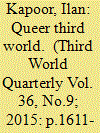

|
|
|
|
|
| Summary/Abstract |
This article attempts to align ‘queer’ and ‘Third World’ – grouping them in their common inheritance of subjugation and disparagement and their shared allegiance to non-alignment and a politics aimed at disrupting domination and the status quo. In assembling both terms one is struck by how, in the mainstream discourse of international development, the Third World comes off looking remarkably queer: under Western eyes it has often been constructed as perverse, abnormal and passive. Its sociocultural values and institutions are seen as deviantly strange – backward, effete, even effeminate. Its economic development is depicted as abnormal, always needing to emulate the West, yet never living up to the mark (‘emerging’ perhaps, but never quite arriving). For their part, postcolonial Third World nation-states have tended to disown and purge such queering – by denying their queerness; indeed often characterising it as a ‘Western import’ – yet at the same time imitating the West and pursuing neoliberal capitalist growth. I want not only to make the claim that the Western and Third World stances are two sides of the same discourse but, drawing on Lacanian queer theory, also to suggest that a ‘queer Third World’ would better transgress this discourse by embracing queerness as the site of structural negativity and destabilising politics.
|
|
|
|
|
|
|
|
|
|
|
|
|
|
|
|
| 8 |
ID:
141141
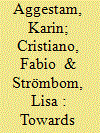

|
|
|
|
|
| Summary/Abstract |
Many contemporary conflicts are framed as antagonistic and difficult to resolve because of their zero-sum framing among the disputants. This article addresses the antagonism–agonism nexus and the political and contested nature of building peace. It has a three-fold aim: (1) to critically assess the interplay between constructive and destructive dynamics; (2) to analyse the circumstances under which conflict may move from antagonism to agonism; and (3) to advance the novel notion of agonistic peacebuilding. The Middle East Peace process is used as a critical case of intractable conflict to elucidate the enabling and restraining conditions for agonistic peacebuilding.
|
|
|
|
|
|
|
|
|
|
|
|
|
|
|
|
| 9 |
ID:
141143
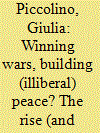

|
|
|
|
|
| Summary/Abstract |
The literature on peacebuilding dedicates very little space, empirically and theoretically, to countries that are emerging from a war waged to a decisive outcome. This review essay looks at Sri Lanka and Rwanda, two countries where a victorious leadership has led the process of post-conflict reconstruction, largely by employing illiberal means. It looks at the effect of decisive war on statebuilding and at the role of local agency and illiberal practices in a post-victory context. It concludes by assessing the global significance and long-term sustainability of post-victory illiberal statebuilding.
|
|
|
|
|
|
|
|
|
|
|
|
|
|
|
|
|
|
|
|
|